A stunning Kimi Walker delivers what may well be a career-best lead performance in Actors Co-op’s mostly successful revival of pioneer African-American playwright Alice Childress’s groundbreaking Trouble In Mind.
Wiletta Mayer (Walker) has been playing one “gem” of a maid after another (Crystal, Pearl, and Opal to name just three) for so many years now, it’s no wonder ancient doorman Henry (Larry Eisenberg) recognizes Wiletta the moment she shows up at the Broadway theater where rehearsals are about to begin on Chaos In Belleville, a melodramatic Deep South potboiler if there ever was one.
 No wonder either that Wiletta has wisdom to impart to recent college grad John Nevins (Freedom), cast as her character Ruby’s bound-to-be-lynched son. (“Tell ‘em you was in the last revival of Porgy And Bess,” she informs the eager young thesp, adding that whatever he does, he’d better keep his mouth shut about what he learned at school.)
No wonder either that Wiletta has wisdom to impart to recent college grad John Nevins (Freedom), cast as her character Ruby’s bound-to-be-lynched son. (“Tell ‘em you was in the last revival of Porgy And Bess,” she informs the eager young thesp, adding that whatever he does, he’d better keep his mouth shut about what he learned at school.)
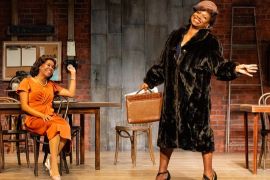 The only school that stage veteran Sheldon Forrester (Rodrick Jean-Charles) ever attended was Hard Knocks, and like the glamorous Millie Davis (Lorinda Hawkins Smith), who specializes in “garden-variety” maids named Magnolia, Chrysanthemum, and Petunia, he knows the best way to stay on good terms with a white director like Al Manners (Spencer Rowe) is to flatter, nod in agreement, and laugh on cue, not that Al’s cowed young assistant Eddie (Brendan Shannon) is any likelier to make waves.
The only school that stage veteran Sheldon Forrester (Rodrick Jean-Charles) ever attended was Hard Knocks, and like the glamorous Millie Davis (Lorinda Hawkins Smith), who specializes in “garden-variety” maids named Magnolia, Chrysanthemum, and Petunia, he knows the best way to stay on good terms with a white director like Al Manners (Spencer Rowe) is to flatter, nod in agreement, and laugh on cue, not that Al’s cowed young assistant Eddie (Brendan Shannon) is any likelier to make waves.
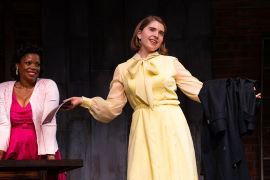 Completing the cast of characters in both play and play-within-play are character actor Bill O’Wray (John Marzilli) in the role of small-town big-shot politico Renard and fresh-out-of-Yale Judy Sears (Sophia Kalugin) as his pampered daughter Carrie, who sets Belleville’s chaos in motion when she asks Daddy to throw birthday gal Petunia and her fellow servants a barn dance, hardly the smartest move with local elections just around the corner.
Completing the cast of characters in both play and play-within-play are character actor Bill O’Wray (John Marzilli) in the role of small-town big-shot politico Renard and fresh-out-of-Yale Judy Sears (Sophia Kalugin) as his pampered daughter Carrie, who sets Belleville’s chaos in motion when she asks Daddy to throw birthday gal Petunia and her fellow servants a barn dance, hardly the smartest move with local elections just around the corner.
 Debuting the same year Rosa Parks took a historic stand by not giving up her seat, Trouble In Mind has lost hardly an iota of its relevance in the nearly seventy years since it scored its writer the first-ever Obie awarded to a female playwright of color.
Debuting the same year Rosa Parks took a historic stand by not giving up her seat, Trouble In Mind has lost hardly an iota of its relevance in the nearly seventy years since it scored its writer the first-ever Obie awarded to a female playwright of color.
Childress’s characters may be archetypes, but each is a shades-of-gray human being with their own foibles, chief among them the redoubtable Wiletta, whose journey towards self-awareness, self-assertiveness, and self-respect gives Trouble In Mind a depth and resonance its lighthearted early scenes scarcely begin to suggest.
 It also gives Co-op treasure Walker the long-awaited opportunity to take center stage, and she digs so deep into Wiletta’s long-repressed resentment at having been consigned to minor, stereotypical roles that when said resentment finally explodes into rage, her “Rosa Parks moment” is quite something to behold.
It also gives Co-op treasure Walker the long-awaited opportunity to take center stage, and she digs so deep into Wiletta’s long-repressed resentment at having been consigned to minor, stereotypical roles that when said resentment finally explodes into rage, her “Rosa Parks moment” is quite something to behold.
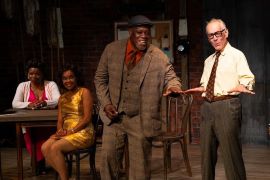 Walker’s costars too take full advantage of the roles Childress has written for them, from Jean-Charles’s make-no-waves Sheldon to Smith’s I’m-fabulous-and-I-know-it Millie to Freedom’s dynamic turn as an articulate college-educated African-American at a time when Amos & Andy were still the norm.
Walker’s costars too take full advantage of the roles Childress has written for them, from Jean-Charles’s make-no-waves Sheldon to Smith’s I’m-fabulous-and-I-know-it Millie to Freedom’s dynamic turn as an articulate college-educated African-American at a time when Amos & Andy were still the norm.
Rowe is terrific too as a Hollywood director who may be in over his head on Broadway (or at least in guiding an interracial cast) and so is Kalugin as a privileged young white woman eager to expand her horizons.
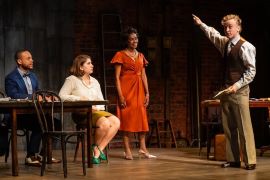 Shannon delivers an engaging featured turn as eager-beaver Eddie, Marzili is effective at revealing Bill’s unconscious racism, and Eisenberg makes for a quaint (perhaps too quaint) septuagenarian with more than a few tales to tell.
Shannon delivers an engaging featured turn as eager-beaver Eddie, Marzili is effective at revealing Bill’s unconscious racism, and Eisenberg makes for a quaint (perhaps too quaint) septuagenarian with more than a few tales to tell.
Where director Kimberly Hébert Gregory missteps is in Trouble In Mind’s Chaos In Belleville sequences, played here more like a 19th-century hiss-the-villain melodrama than simply in the heightened style that was the pre-method norm.
 Design-wise the production could not be finer, from Joel Daavid’s pitch-perfect backstage set (kudos shared with scenic artist Marien Walton) to Wendell C. Carmichael’s gorgeous late-1950s fashions, to Emmett Lee Merritt’s mostly period-appropriate props, to Martha Carter’s striking lighting design, to Marc-Antonio Pritchett’s pitch-perfect sound design, to Judi Lewin’s era-evoking hair, wig, and makeup designs.
Design-wise the production could not be finer, from Joel Daavid’s pitch-perfect backstage set (kudos shared with scenic artist Marien Walton) to Wendell C. Carmichael’s gorgeous late-1950s fashions, to Emmett Lee Merritt’s mostly period-appropriate props, to Martha Carter’s striking lighting design, to Marc-Antonio Pritchett’s pitch-perfect sound design, to Judi Lewin’s era-evoking hair, wig, and makeup designs.
Trouble In Mind is produced by Crystal Yvonne Jackson and features songs by John Deaver and Carol Weiss. Fernando Gonzalez is assistant lighting designer. Zarah Ferrer is stage manager and Kira Daehlin is assistant stage manager.
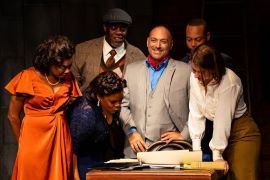 With a cast reflecting Actors Co-op’s post-pandemic diversity and a play that could not have been more ahead of its time when it debuted, Alice Childress’s mostly forgotten groundbreaker opens the Christian-based membership company’s 3-play 2024-2025 season to powerful effect. Though I’d recommend rethinking the play-within-a-play sequences, even as is Trouble In Mind packs quite a punch.
With a cast reflecting Actors Co-op’s post-pandemic diversity and a play that could not have been more ahead of its time when it debuted, Alice Childress’s mostly forgotten groundbreaker opens the Christian-based membership company’s 3-play 2024-2025 season to powerful effect. Though I’d recommend rethinking the play-within-a-play sequences, even as is Trouble In Mind packs quite a punch.
Actors Co-op, 1760 N. Gower St., Hollywood.
www.actorsco-op.org
–Steven Stanley
October 6, 2024
Photos: Kamal Bolden
Tags: Actors Co-op, Alice Childress, Los Angeles Theater Review


 Since 2007, Steven Stanley's StageSceneLA.com has spotlighted the best in Southern California theater via reviews, interviews, and its annual StageSceneLA Scenies.
Since 2007, Steven Stanley's StageSceneLA.com has spotlighted the best in Southern California theater via reviews, interviews, and its annual StageSceneLA Scenies.







 COPYRIGHT 2025 STEVEN STANLEY :: DESIGN BY
COPYRIGHT 2025 STEVEN STANLEY :: DESIGN BY